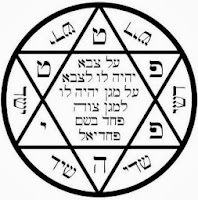(More to follow)
Friday, April 6, 2012
Sacred Writ & Kameot: Psalms.....Psalms.....Everywhere! - Part 1
In ancient days two kinds of scriptural texts were chosen for practical or magical purposes, i.e. verses containing God-names, or referring to Divine power and deeds, and those verses which appear to be especially aligned with the specific condition necessitating their employment. It was believed that these portions of scripture are filled with a celestial power capable of affecting a definite result, when used with proper Kavvanah, i.e. appropriate attitude, mindset and focussed intention. It should be noted that the entire Hebrew Bible is considered to be comprised of “God-names,” these being understood to be present in every single sentence of holy writ. Thus we often encounter magical instructions which are accompanied by the instruction to “Recite this verse with its name.....” It has been written that “the entire Torah is composed of the names of God, and in consequence it has the property of saving and protecting man.”Some years ago I was queried as to whether it was appropriate for non-Jewish students of Kabbalah “to use the Jewish Prayer book and the Tehillim on a daily basis.” As it is, I believe it absolutely appropriate for anybody to use the Siddur (Jewish Prayer Book)and the Hebrew Bible. Why not? What is important is the intention of the one using these texts. If a person is inspired and moved by their use, I cannot see why that individual should not derive great benefit rather than otherwise. Naturally I cannot be sure that the whole of international Jewry would back me on this, but I certainly cannot see the Divine One imposing some sort of frightful reprisal on any individual using a Siddur and reciting Tehillim (Psalms) with proper Kavvanah (focussed intention). The reference in the query to “Tehillim” (Psalms) is of particular importance to those interested in the magical workings of Kabbalah Ma’asit (Practical Kabbalah). Recognising the power of the Hebrew psalms, an entire magical system was developed and published in a work titled the “Sefer Shimmush Tehillim” (Book of the Magical Use of Psalms).Though attributed to Rav Hai Gaon, this text was written by an anonymous author. It is a fairly small, anonymous, mediaeval compilation, existing in several Hebrew editions, as well as in an Aramaic manuscript, which was translated into several languages. Its popularity led to the Vatican ultimately placing it on the “Index Librorum Prohibitum” (“Index of Forbidden Books”). An acquaintance and serious researcher of this text, referred to the Shimmush Tehillim as a “cookbook” since “it gives a list of recipes, each requiring the use of a chapter or verses from the book of Psalms, to solve various problems, but gives no rationale or explanation for them.”This mysterious text pertains to the magical and theurgical use of Divine Names, which, as said, is based on the idea that the entirety of holy writ is comprised of the Names of God. In many instances in the Shimmush Tehillim, the special emphasis is on “Divine Names” which gives the psalms their magical potencies. Individual verses and entire psalms are employed in a magical way for a wide range of physical and spiritual needs, like protection from demons, illness, or against an attack from man and beast, etc. Using several Kabbalistic methods, magical names were formed from letters derived from their respectively associated psalms. In most cases the methodology employed in the construction of these Names is lost, or at least very difficult to ascertain, since the possible combinations and permutations of the Hebrew letters are factually endless. Of course, the manner in which the Divine Names, employed in this enigmatic text, were composed, is really unimportant. What really matters is the effectiveness of the magical techniques shared in this remarkable little text.As it is, the various psalms are considered extremely powerful, and their religious fervor and beauty are highly regarded. Psalms are recited during all critical situations in the public and private lives of people, and each week the entire book is completely read in certain communities, not only as part of religious ritual, but in the belief that this is the most powerful protection of the community against harm. It was often considered good enough to recite in alphabetical order the psalms which spell the name of a city in danger, as the most effective means of protection. In the Shimmush Tehillim psalms are employed in a magical sense for highly personal and quite mundane objectives, albeit very important ones in terms of human survival on this planet. In fact, the entire biblical Book of Psalms formed a major component of the “magical gear” of mediaeval magicians.A popular English translation, available since 1788, was made of the Sefer Shimmush Tehillim by an anonymous translator in America from a certain Godfrey Selig’s German version of this text. It was eventually incorporated in a spurious magical compilation titled “The Sixth and Seventh Books of Moses.” A favourite of “Hoodoo” and those who have a predilection for American “folk magic,” this translation was also published under the title “Secrets of the Psalms.” Besides being extremely verbose, there are unfortunately many errors and corruptions of Hebrew words and Divine Names in this translation. One would have expected the translator to have cross-checked each magical prescription with its associated Psalm in the Bible, so as to ensure that the terms used are correct, especially in cases where a word clearly does not exist in Hebrew, and a quick perusal of the appropriate Psalm would expose it as a corruption of a well-known Hebrew term. As it is, the translator/publisher deemed it necessary to insert every now and again an “admonition from the translator” in the text, cautioning against the incorrect use of these magical techniques, which again leaves one quite perturbed as to why these only too obvious errors were allowed into the translation.
Subscribe to:
Post Comments (Atom)





















No comments:
Post a Comment